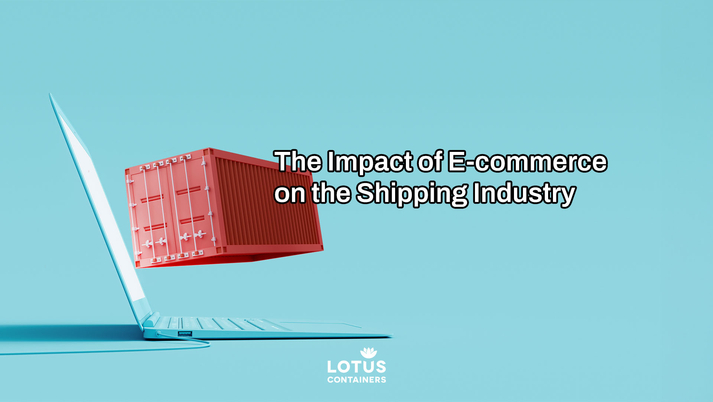Online purchases have become part and parcel of daily life as the shipping industry receives a huge influx of orders for shipment from e-commerce. The impact of e-commerce on the shipping industry is such that it has led to the integration of advanced technologies in the trade industry to enhance the buying experience for customers. E-commerce is gaining immense popularity daily, and transporting goods across the supply chain rests on the shipping industry. Therefore, logistics industries are expected to operate with enhanced efficiency and make timely deliveries to retain customers. Let us learn how e-commerce has impacted the shipping industry.
What is traditional commerce?
The bloom of commerce in a country is a primary factor leading to dynamic trade growth and a robust national economy. People across the globe engage in selling and purchasing products and services daily. To fulfil the supply chain’s demands, offline stores became a prime source of traditional commerce, expanding in urban and rural areas. In earlier days, every purchase and transaction took place face-to-face in an offline mode where customers could bargain and select products from the limited resources available at the store. Traditional commerce is still highly prevalent in many places, such as provisional stores, hypermarkets, and high-end stores in malls. But soon, with the infusion of technology in the supply chain, trade shifted to electronic platforms to reach a diverse set of consumers.
Limitations in traditional commerce
Offline stores extended newer benefits to their users but still failed to retain consumer interest. The customers got to see and check what they had before investing and could bargain to reach a fair amount for the product. But with the advent of technology, the effect of offline stores slowly began to fade. A few of the reasons were –
- Limited stores – Only some locations could market the different types of products and services, leading to restricted access to people living in far-off places.
- Fixed timings – Not all people can purchase things during the business hours specified by stores. In emergencies, people could not buy supplies as the stores generally remained closed at night.
- Stock out – It was a waste of time to travel to offline stores and end up disappointed as they did not have enough resources to pick from.
- Costly – Since offline stores had to keep up with the interior design and ambience, hire employees, and pay rent of the store, thereby making the products and services even more expensive.
Use of technology in trade and commerce
As the supply chain network began expanding, it became somewhat difficult to control the multiple operations of the supply chain. Therefore, optimising it was the only solution to increasing its efficiency. Although digitisation entered the field of trade and commerce years ago, e-commerce gained pace and reliability only recently. The trading ecosystem started full-scale accommodation of e-commerce during the pandemic when most offline stores were shut. People realised the importance of online stores, and brands worked their way into gaining consumers’ trust. Online transactions through gateways and sites promoted online buying and selling of products and services locally and anywhere across the globe. Technology has helped in enhancing logistic operations and promoting e-commerce internationally.
- With the help of AI technology, customers can now get a list of personalised products to pick and order.
- The impact of blockchain technology has made it easier, more flexible and more secure to carry out multiple shipping operations, including transactions and tracking the lifecycle of assets.
- IoT in the shipping industry helps get real-time data and monitor your shipment’s status and whereabouts throughout its journey in the supply chain.
- The digital twin technology helped test newer products and services by forming their duplicates through 3-D printing and experimenting with them in the virtual world.
What is the impact of e-commerce on the shipping industry?
Plenty of small and large e-commerce sites are dependent on the shipping and logistics industry to carry out cargo handling and transportation tasks. The need to meet the supply chain demands and timely delivery of goods to their destination is increasing. Millions of people place online orders every minute across the globe, and it is the job of the shipping industry to timely fulfil it. It has become essential for the logistics network to increase its productivity and deliver advanced services to the shippers. A few impacts of e-commerce on the shipping industry are –
- Enhanced logistic services – Due to increased demand for faster, safer and more reliable e-commerce, the logistics industry is investing more in its infrastructure and updating itself with newer technology. It has led to automating warehouses and delivery centres to minimise human input and fasten logistic operations.
- Accommodating newer transport – Transcontinental trade can occur via roads and rail quickly, although cross-border trade needs to adopt different means. For this, shipments are carried through air and maritime transport to ship larger or costlier shipments internationally.
- Increasing job opportunities – The impact of automation has entered the very roots of e-commerce. But the demand for skilled labourers to operate technology-driven applications still exists. As a result, the supply chain, including the logistics sector, has become one of the significant employers worldwide.
- Multi-warehousing – The e-commerce companies store goods in large volumes at warehouses, ready to be shipped to the customers. The shippers split the inventory and scatter these goods into multiple warehouses across a country or multiple countries so that they provide faster delivery.
The impact of e-commerce on the shipping industry has led many shippers to switch to automation and newer technological evolutions. Technology helps maintain a consistent flow of goods in the supply chain and provides a better customer experience.
LOTUS Containers is a robust marketer of shipping container services in the USA and across the globe. We aid e-commerce activities by selling and leasing different types of shipping containers to transport goods nationally and internationally.




